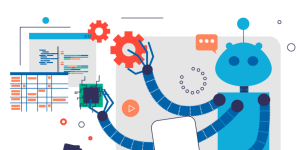content
AI development
February 19, 2025
6 min read
Introduction
Technology is advancing faster than ever. Artificial intelligence (AI) is at the center of this transformation. It is changing the way software is built, tested, and maintained. But beyond automation and efficiency, AI is also changing the way developers think, work, and collaborate. Let’s take a look at how AI is transforming software development and what it means for the industry.
Smarter Code Generation and Assistance
Writing code is a complex task. Developers spend hours structuring logic, debugging errors, and optimizing performance. AI-powered tools like GitHub Copilot and ChatGPT are changing that. These tools act as virtual coding assistants, helping developers generate code, suggest improvements, and even fix bugs in real-time.
Instead of starting from scratch, developers can now describe what they need, and AI can generate an initial structure. This speeds up the process significantly. It also reduces the mental strain of writing repetitive code. However, developers still need to refine and review AI-generated suggestions to ensure quality and security.
Automated Testing and Debugging
Testing is an important but time-consuming part of software development. AI makes it more efficient. AI-powered testing tools can automatically identify errors, generate test cases, and predict potential failures before they happen.
For example, AI-powered test automation tools like Test.ai and Applitools analyze patterns of previous errors. They can then predict where new problems are likely to arise. This reduces the time spent on manual testing and improves software reliability.
Also, AI helps with debugging by scanning code for common errors and security vulnerabilities. Tools like DeepCode and Codacy provide real-time feedback, helping developers fix problems before they become serious.

Enhanced Project Management and Collaboration
Software development is about more than just writing code. Managing projects, tracking progress, and ensuring team collaboration are equally important. AI improves these aspects, too.
AI-powered project management tools analyze data from past projects to estimate deadlines, allocate resources, and predict bottlenecks. Tools like Jira and Monday.com now use AI to optimize workflows and provide smart recommendations.
For teams working remotely, AI improves communication. It can summarize meetings, generate action points, and even analyze team sentiment. This helps managers identify potential issues before they impact productivity.
More Efficient Software Maintenance
Software isn’t just built and forgotten. It requires constant updates, bug fixes, and security patches. AI plays a major role in automating maintenance tasks.
Predictive maintenance is one of the biggest breakthroughs. AI analyzes software performance data and detects anomalies that may indicate future failures. Instead of waiting for something to break, developers can proactively fix problems before users even notice.
AI also helps in refactoring old code. It can suggest improvements to improve performance and security. This is especially useful for legacy systems that need modernization.
Personalized User Experiences
Modern software must adapt to the needs of its users. AI-powered personalization makes this possible. By analyzing user behavior, AI can tailor applications to individual preferences.
For example, AI in e-commerce platforms suggests products based on browsing history. In media streaming apps, it curates personalized recommendations. Even in enterprise software, AI customizes dashboards and workflows to each user’s habits.
This level of personalization improves the user experience, increases engagement, and increases customer satisfaction.

The Rise of Low-Code and No-Code Development
Not everyone who needs software is a developer. AI-powered low-code and no-code platforms are changing the way apps are built. These platforms allow users to build apps with minimal coding.
Tools like Bubble, OutSystems, and Microsoft Power Apps allow companies to build software quickly. AI helps by automatically generating code snippets, suggesting UI improvements, and optimizing app logic.
This democratization of software development means more people can bring their ideas to life without deep technical knowledge.
AI-Powered Security Enhancements
Cybersecurity is becoming an increasingly serious issue in software development. AI enhances security measures by detecting and eliminating threats in real-time.
AI-powered security tools constantly monitor applications for suspicious activity. They can detect anomalies that may indicate cyberattacks and take immediate preventive action. AI also helps in code security analysis by scanning for vulnerabilities and suggesting fixes.
By integrating AI into security practices, developers can create more resilient and secure applications.
Future of AI in Software Development
AI does not replace developers. Instead, it augments their capabilities. The role of a software developer is shifting from writing every line of code to managing AI-powered tools, ensuring quality, and focusing on solving higher-level problems.
As AI continues to evolve, we can expect even more advanced capabilities. From self-correcting code to fully autonomous software development environments, the possibilities are exciting.
However, there are also ethical considerations to consider. AI-generated code needs to be monitored for bias and security risks. Developers must maintain control and use AI as a tool, not a replacement.

Conclusion
AI is revolutionizing software development. It makes coding smarter, testing faster, and project management more efficient. It improves security, delivers personalized user experiences, and democratizes software creation.
The future of software development isn’t just about writing code – it’s about working with AI to create better, smarter apps. Developers using AI will be more productive, innovative, and able to solve complex problems. As AI continues to evolve, the software industry will evolve with it, bringing new capabilities and redefining what’s possible.
If you have any questions or an idea for an AI development project, contact us via sales@instandart.com or fill out the form on the main page of the site to discuss. We are always ready to help!
